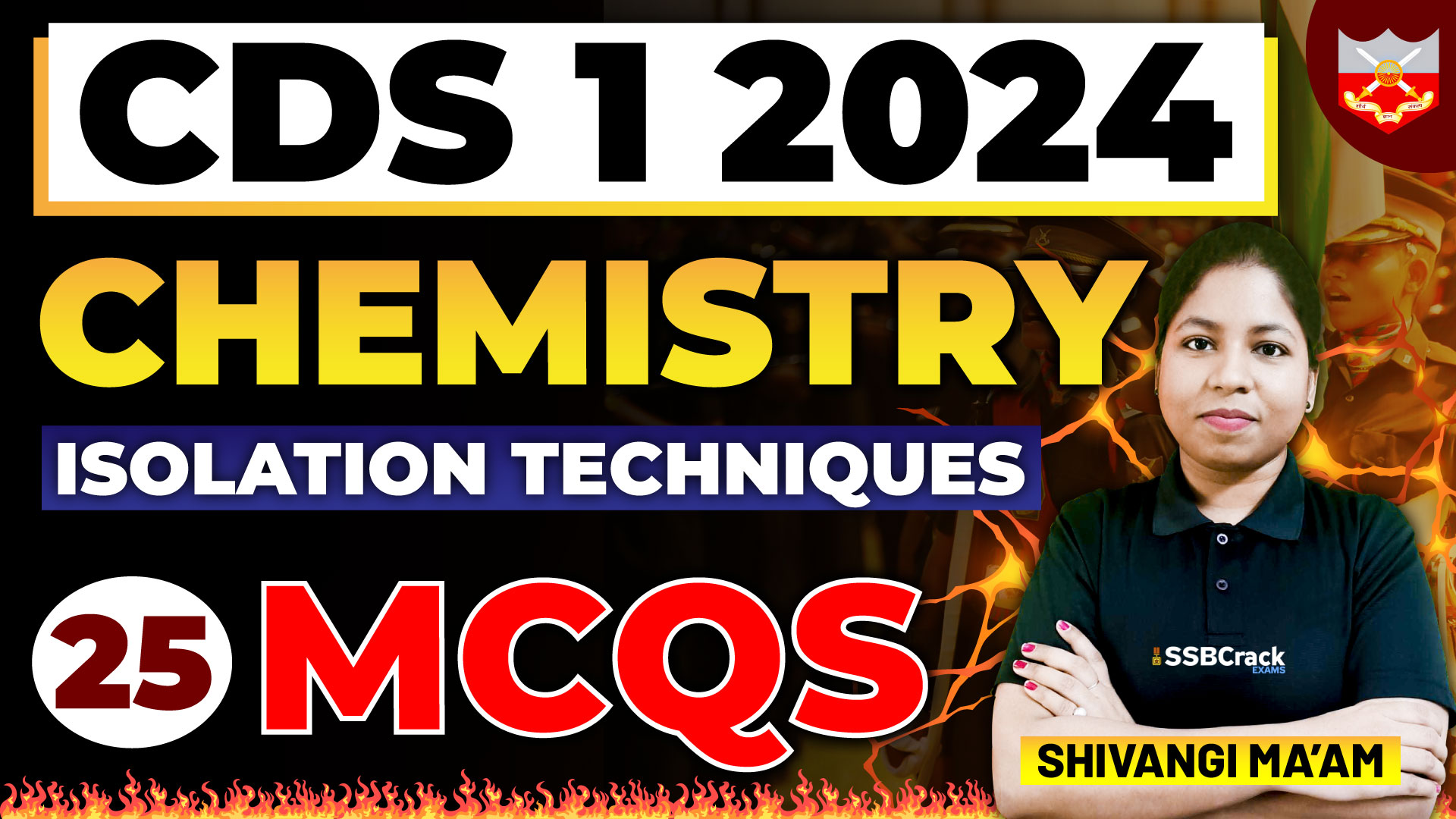The Combined Defence Services (CDS) examination is a gateway for aspirants aiming to serve their nation through the armed forces. Among its various components, the Chemistry section holds paramount importance, especially in understanding vital concepts like Isolation Techniques. In the CDS 1 2024 examination, the incorporation of Multiple Choice Questions (MCQs) in the Chemistry lecture on Isolation Techniques stands as a crucial tool for evaluating candidates’ comprehension and analytical skills.
Importance of MCQs in CDS 1 2024 Chemistry Lecture:
- Assessment of Understanding: MCQs provide a structured approach to assess candidates’ understanding of Isolation Techniques. Through carefully crafted questions, examiners gauge the depth of knowledge and clarity of concepts possessed by aspirants. This aids in distinguishing candidates who possess a comprehensive understanding from those who have a superficial grasp of the subject matter.
- Encouraging Application of Knowledge: The design of MCQs in the CDS 1 2024 Chemistry lecture prompts candidates to apply their theoretical knowledge to practical scenarios. Isolation Techniques demand not only theoretical comprehension but also the ability to apply these concepts in real-world situations. MCQs, therefore, serve as a platform for candidates to demonstrate their analytical skills and problem-solving abilities.
- Time-Efficient Evaluation: In a competitive examination like CDS, time management is crucial. MCQs streamline the evaluation process, allowing for efficient assessment of a large number of candidates within a stipulated timeframe. By presenting options alongside questions, MCQs enable swift decision-making, ensuring that candidates can cover a wide range of topics within the allocated time.
- Objective Nature: The objective nature of MCQs minimizes subjectivity in evaluation, ensuring fairness and impartiality. Each question has a definitive correct answer, eliminating ambiguity in grading. This transparency in assessment enhances the credibility of the examination process and instills confidence in candidates regarding the fairness of their evaluation.
- Diagnostic Tool for Learning: MCQ-based assessments not only serve as a means of evaluation but also as a diagnostic tool for learning. By analyzing the patterns of responses, educators and candidates alike can identify areas of strengths and weaknesses. This feedback loop facilitates targeted learning interventions, enabling candidates to focus their efforts on areas that require improvement.
- Adaptability to Technological Platforms: With advancements in technology, MCQs can be seamlessly integrated into online examination platforms. This adaptability enhances accessibility and convenience for both candidates and examiners. Additionally, digital platforms offer features such as randomization of questions and instant feedback, further enriching the assessment experience.
Conclusion: The incorporation of MCQs in the CDS 1 2024 Chemistry lecture on Isolation Techniques underscores their pivotal role in evaluating candidates’ understanding and proficiency. By providing a structured framework for assessment, MCQs facilitate fair, objective, and time-efficient evaluation. Moreover, they serve as a diagnostic tool for learning, enabling candidates to identify areas for improvement. As the armed forces continue to seek individuals with a strong foundation in science and technology, the significance of MCQs in examinations like CDS cannot be overstated.
Isolation Techniques MCQs
- Which Of the Following Separation Methods Should Be Adopted To Separate
An Aqueous Mixture Of Common Salt Contaminated With Limestone?
A. Use of separating funnel and then filtration of the aqueous mixture
B. Distillation and then use of a separating funnel
C. Sublimation and then distillation of the aqueous mixture
D. Filtration and then evaporation of the aqueous mixture
ANSWER: D - Which Of the Following Method Is NOT Used For Separation Of A Solid And A
Liquid?
A. Fractional Distillation
B. Evaporation
C. Filtration
D. Purification by Crystallization
ANSWER: A - Which Of the Following Methods Can Be Used to Separate Acetone and Water
from Their Mixture?
A. Chromatography
B. Fractional distillation
C. Distillation
D. By using a separating funnel
ANSWER: C - A magnet could be used to separate
A. sand and salt
B. sand and iron filings
C. water and sand
D. colours in a food dye
ANSWER: B - The Phenomenon of Water Being Able to Rise Up a Narrow Tube Is Called
A. distillation
B. capillary action
C. chromatography
D. filtration
ANSWER: B
For More MCQs On This Topic Refer To the video & Attached PDF







